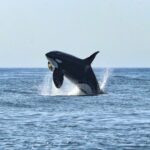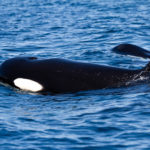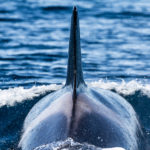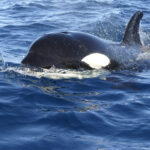Iberian Orca
Orcinus orca
Iberian orcas (Orcinus orca) are a small, isolated subpopulation of killer whales found in the northeastern Atlantic, especially along the coasts of Portugal, Spain, and the Strait of Gibraltar. They are genetically and behaviorally distinct from other orca populations. As of recent assessments, Iberian orcas are classified as critically endangered by Spanish authorities, with fewer than 40 individuals estimated in the wild. These orcas are tuna-hunters—particularly the Atlantic bluefin tuna (Thunnus thynnus). They have developed sophisticated hunting techniques to target tuna. Like other orcas, the Iberian group lives in matrilineal pods, where offspring stay with their mothers for life. However, their social groups are small, and recent studies have shown shifts in pod composition and movement patterns, possibly due to environmental stress. Since 2020, some Iberian orcas—particularly juveniles and subadults – have been observed interacting with sailboats, sometimes damaging rudders. Scientists believe this could be a learned behavior within a few individuals. Iberian orcas have a distinct set of vocalizations and dialects, which are used for communication, coordination during hunting, and maintaining social bonds. They seasonally migrate along the Iberian coast, especially around the Gulf of Cádiz and Strait of Gibraltar, closely following the migration of tuna. You can (rarely) find these Orcas in Faro at almost any given time of the year, but with higher chances during spring & summer!







